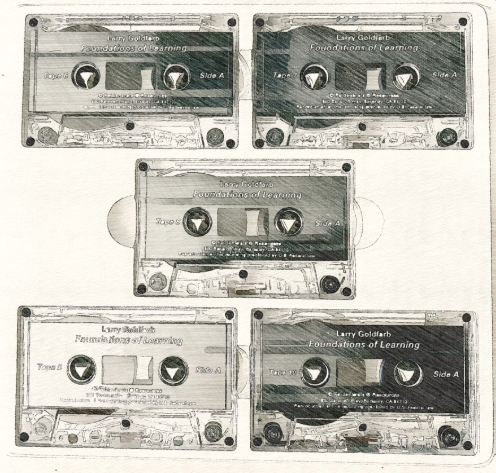
From the vault, Part II

While digging into the vault of workshops that I’ve taught and recorded to decide what to release Black Friday this year, I also found the boxed collection of cassette recordings of a workshop about developmental learning. I taught this course, Foundations of Learning, to interested parents, teachers, therapists, and pediatricians in Innsbruck, Austria in 1993.
This workshop brought together my practice working with infants, toddlers, and older children in private practice with what I knew about systems theory and what I’d been learning in my graduate Kinesiology program. Listening to it after all these years, I was struck by how I’d used developmental movement as an example of thinking systemically . . . and systemic thinking as a way of understanding how development happens. There’s plenty also about the underpinnings of Moshe’s method, the logic of learning, the perceptual basis of change, and where new skills come from. Though the workshop focuses on how infants learn, it offers a practical roadmap for understanding how human abilities develop.
When I checked the recording of the workshop, it turned out that they were somewhat jumbled up and incomplete. Sorting through the contents of the ten cassettes, I couldn’t find a handful of the Awareness Through Movement® lessons. I found later versions to replace three of the missing ones, but there are two lessons for which I could find no replacements. So, we’ve included two versions of a key lesson from the collection, FROG LEGS.
- EXPLORING THE BABY POSE
- EXPLORING THE BABY POSE – Continued
- CIRCLING THE KNEE
- FROG LEGS
- FROG LEGS – Version 2
- FROG LEGS – Version 3
- TONGUE CIRCLES
- SEQUENTIAL ROLLING, LIMBS OVER CHEST
- FLEXING O
- FLEXING O – Continued
- ROLLING VARIATIONS
- SIDE-SIT TO HANDS & KNEES – Complete
- COMING TO HANDS & KNEES
- COMING TO CREEPING
Most of the talks from the workshop, six of them to be precise, also survived:
- Evaluating Movement
- Problems and patterns
- Taking another look at SPIFFER – What is optimal
- Self-regulation
- The seven Cs
- Review of the 7 Cs with equivalents Auf Deutsch

Luckily, one of the participants in the course, Daniel Rosenfels, an American physical therapist and Feldenkrais® teacher who lives in Vienna, took detailed and extensive notes throughout. He was kind enough to give me permission to make all 60 pages of notes available along with the recordings. What’s particularly valuable about these notes is that they aren’t a simple review or summary of what I presented; instead, they’re his insightful and complementary take on the material I presented.
In celebration of the re-release of Foundations of Learning, if you purchase this digital learning resource before midnight California time this coming Sunday, 15 December 2019, you will get a copy to share with your study buddy, colleague, or friend for free.
Your thoughts?
Please let us know your perspective! Add your comments, reactions, suggestions, ideas, etc., by first logging in to your Mind in Motion account and then clicking here.
Commenting is only available to the Mind in Motion Online community.
Join in by getting your free account, which gives you access to the e-book edition of Articulating Changes (Larry's now-classic Master's thesis), ATM® lessons, and more — all at no charge whatsoever.
To find out more and sign up, please click here.
Please share this blog post
 This work is licensed under a Creative Commons Attribution-ShareAlike 4.0 International License
This work is licensed under a Creative Commons Attribution-ShareAlike 4.0 International License
This blog may contain one or more affiliate links. When you click on a link and then make a purchase, Mind in Motion receives a payment. Please note that we only link to products we believe in and services that we support. You can learn more about how affiliate links work and why we use them here


Responses